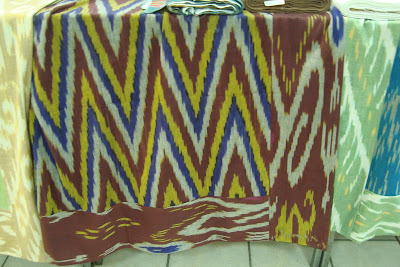Well, this may be typical for Uzbekistan.. I just worked one and a half hour on this new entry, and then the internet -connection appeared to have been interrupted, so there was nothing left. Again......
My arrival this morning, march 3, 2012, was perfect: only a few people to check in (all the other 100 or so passengers from Riga to Tashkent went on, to the transfer to Thailand.... cheap flight?). No problems with customs, even though I carried this lovely spice cake (groninger koek); Robert waiting for me, be it behind a strong fence, about 50 meters outside of the airport.
In the last 3 days I have been reading the very enjoyable book " a carpet ride to Khiva" by Christopher Aslan Alexander (a must read to understand the culture here, easily available at amazon.com). He lived here from 2000-2005, reintroducing traditional carpetweaving and natural dying of silks in Khiva. He mentions that 9/11 wasn't considered such an interesting event here, until the gov' t discovered that the accusation of Al Quaida gave them a good reason to prosecute and suppress extreme moslims.

 We walked around the area, also for some household shopping. There's an ' allee' along the park, lined with bookstalls; even selling a poster to practise the Cyrillic alphabet, useful!
We walked around the area, also for some household shopping. There's an ' allee' along the park, lined with bookstalls; even selling a poster to practise the Cyrillic alphabet, useful!
In the government store ( looking like a 1960's warehouse) we found to our suprprise the most beautiful IKAT textiles, mixed silk and cotton. see picture. Cotton is very important in this country, even included in the national emblem, but very insustainable, both socially and ecologically. All the people are expeted to work 3 weeks in the harvesting, without getting paid for it. and the cotton uses up all the irrigation water, resulting in the Aral lake drying up and the area siltening.
My arrival this morning, march 3, 2012, was perfect: only a few people to check in (all the other 100 or so passengers from Riga to Tashkent went on, to the transfer to Thailand.... cheap flight?). No problems with customs, even though I carried this lovely spice cake (groninger koek); Robert waiting for me, be it behind a strong fence, about 50 meters outside of the airport.
In the last 3 days I have been reading the very enjoyable book " a carpet ride to Khiva" by Christopher Aslan Alexander (a must read to understand the culture here, easily available at amazon.com). He lived here from 2000-2005, reintroducing traditional carpetweaving and natural dying of silks in Khiva. He mentions that 9/11 wasn't considered such an interesting event here, until the gov' t discovered that the accusation of Al Quaida gave them a good reason to prosecute and suppress extreme moslims.

So the saturday morning was extremely quiet without the endless broadcasting of moslim prayers by the muezzin from minarets (also forbidden here), as we know that from Jordan, Ethiopia, Indonesia. On top of that: a warm 15 degrees Celsius, true springtime feeling,and the very bright springtime light .
The picture shows where we live, an appartment in the bloc to the right, second floor. It's a nice neighbourhood, lots of trees, birds, a metrostation nearby and asmall supermarket round the corner.
The picture shows where we live, an appartment in the bloc to the right, second floor. It's a nice neighbourhood, lots of trees, birds, a metrostation nearby and asmall supermarket round the corner.
 We walked around the area, also for some household shopping. There's an ' allee' along the park, lined with bookstalls; even selling a poster to practise the Cyrillic alphabet, useful!
We walked around the area, also for some household shopping. There's an ' allee' along the park, lined with bookstalls; even selling a poster to practise the Cyrillic alphabet, useful! 

Geen opmerkingen:
Een reactie posten